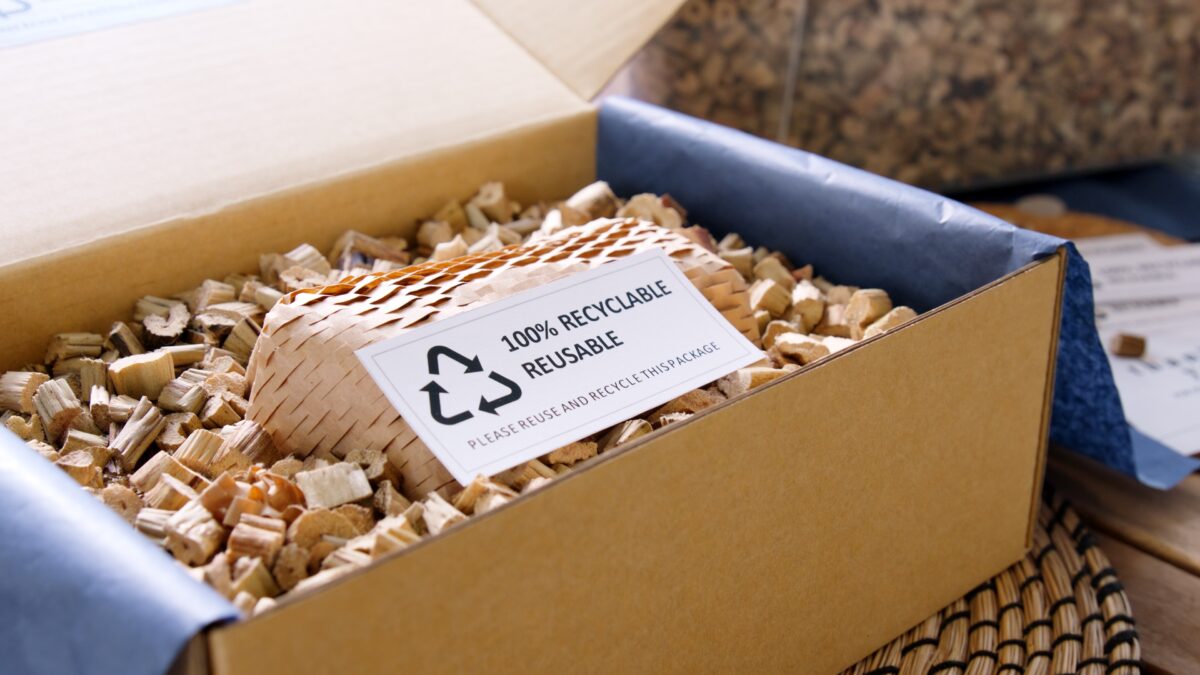2025 Survey Results: Only 20% of Consumers Believe Brand Sustainability Claims
Sustainability has become a core brand strategy. Companies across all industries are investing in eco-friendly initiatives, promoting green products and publicly committing to environmental responsibility. But the real question is: what perceptions do consumers have of sustainability, and, more importantly, how do they influence purchasing decisions?
To explore these critical questions, Blue Yonder commissioned a comprehensive 2025 Sustainability Survey. Conducted by a third-party provider in February 2025, this survey reached over 5,000 consumers across Australia and New Zealand (ANZ), France, Germany, U.K., and U.S. Our goal was to gather in-depth insights into their sustainable shopping preferences, perceptions of corporate sustainability initiatives, and overall sentiment towards environmental responsibility.
This blog post will delve into some of the most compelling findings from this exclusive survey.
78% of consumers believe sustainability is important in purchasing
78% of consumers consider sustainability considerations as somewhat or very important when choosing to buy a product or shop at a retailer. This is especially true in France, where 86% of consumers think sustainability considerations are important.
Only a small minority (6%) dismissed sustainability as unimportant, with the 16% of remaining consumers saying they were neutral to sustainability considerations.
47% of consumers are willing to spend an additional 5% – 9.9% on sustainable products. Interestingly, this figure continues to increase year over year in the U.S. compared with previous Blue Yonder survey results, rising from 40% in 2024 to 44% in 2025.
In addition, 62% of consumers are likely to choose a retailer if they offered more sustainable delivery options. This is especially true in France with 71% of consumers saying they would be more likely to go with that retailer, followed by Germany at 65%.
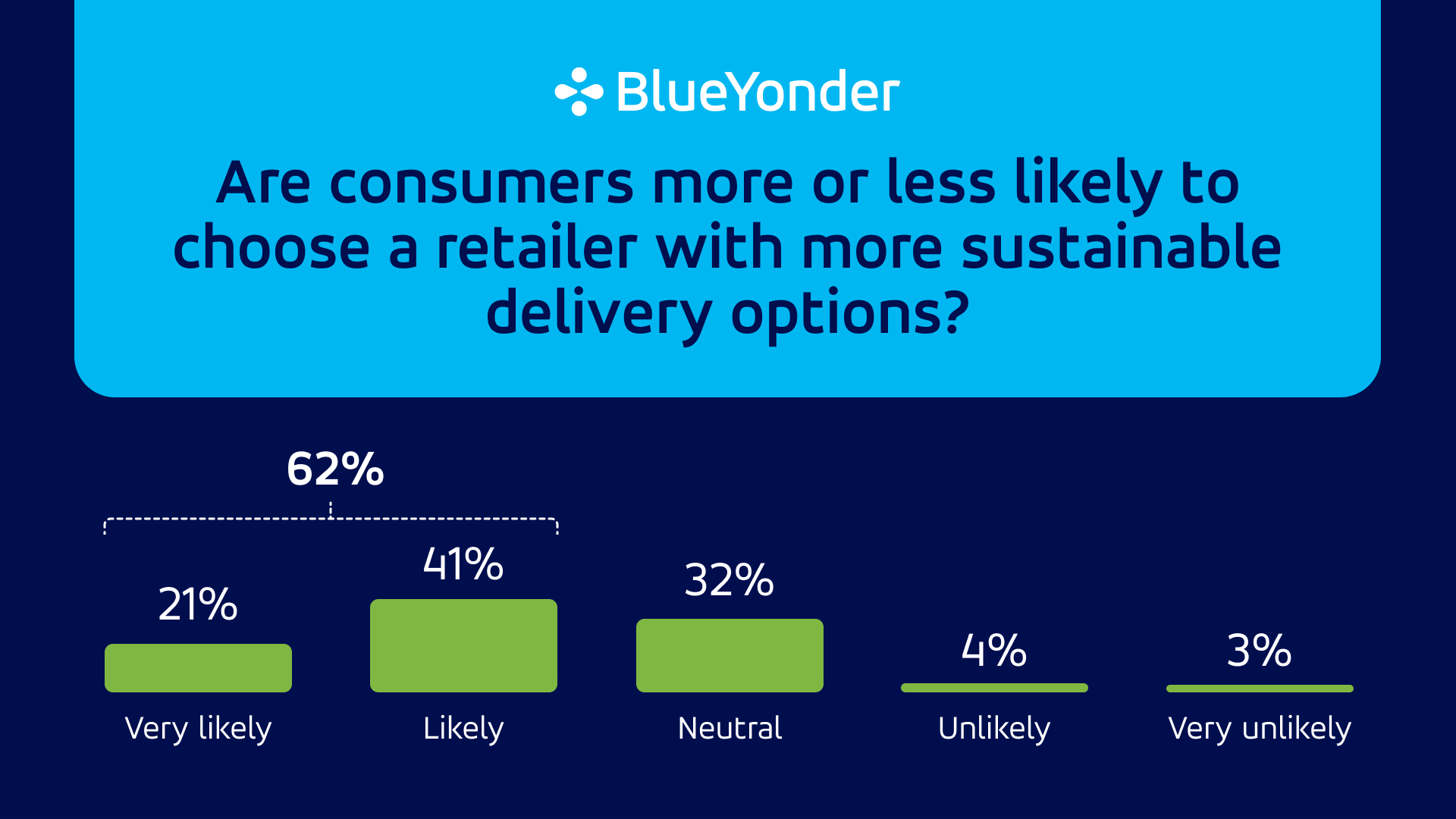
Consumers say sustainability is an important factor in their purchasing decisions. Almost two-thirds (65%) are willing to spend more money on sustainable products, and 62% would go with a retailer if they offered more sustainable delivery. Despite all of this, only 29% of consumers have switched their brand loyalty toward companies they perceive as exhibiting more sustainable practices. Although this is an impactful change, it’s a big gap compared to the large number of consumers who express a strong commitment to sustainability.
There’s a notable gap between consumer aspirations and their real-world actions. This suggests that while consumers recognize the importance of sustainability and are prepared to make changes for it, other factors still play a significant role in their final decisions.
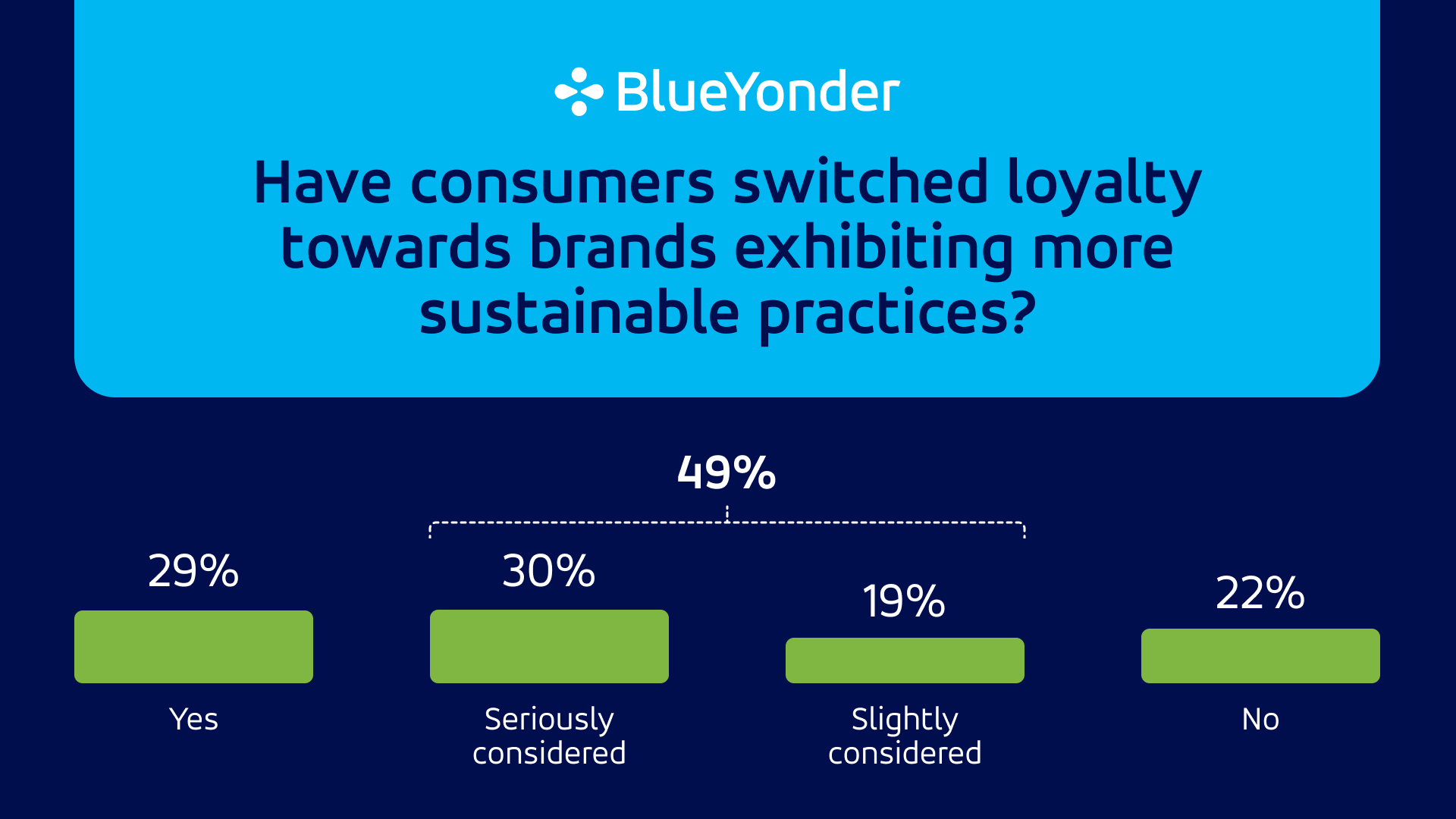
Cost and convenience will always impact purchasing
Price and convenience play a huge role in their purchasing decisions.
While nearly half (47%) of consumers are open to spending 5% – 9.9% more on sustainable options, a significant 54% cite the higher cost as a barrier to purchasing.
When it comes to receiving packages, 62% of consumers are drawn to more sustainable delivery options. While a majority (87%) are willing to delay deliveries for sustainability, most are only willing to delay it one to two days (30%) and three to five days (36%). Only 15% of consumers will wait up to one week for their deliveries if it means being more sustainable. U.S. consumers are less willing to wait, with only 11% of consumers willing to delay deliveries a week, followed by the U.K. at 12%.
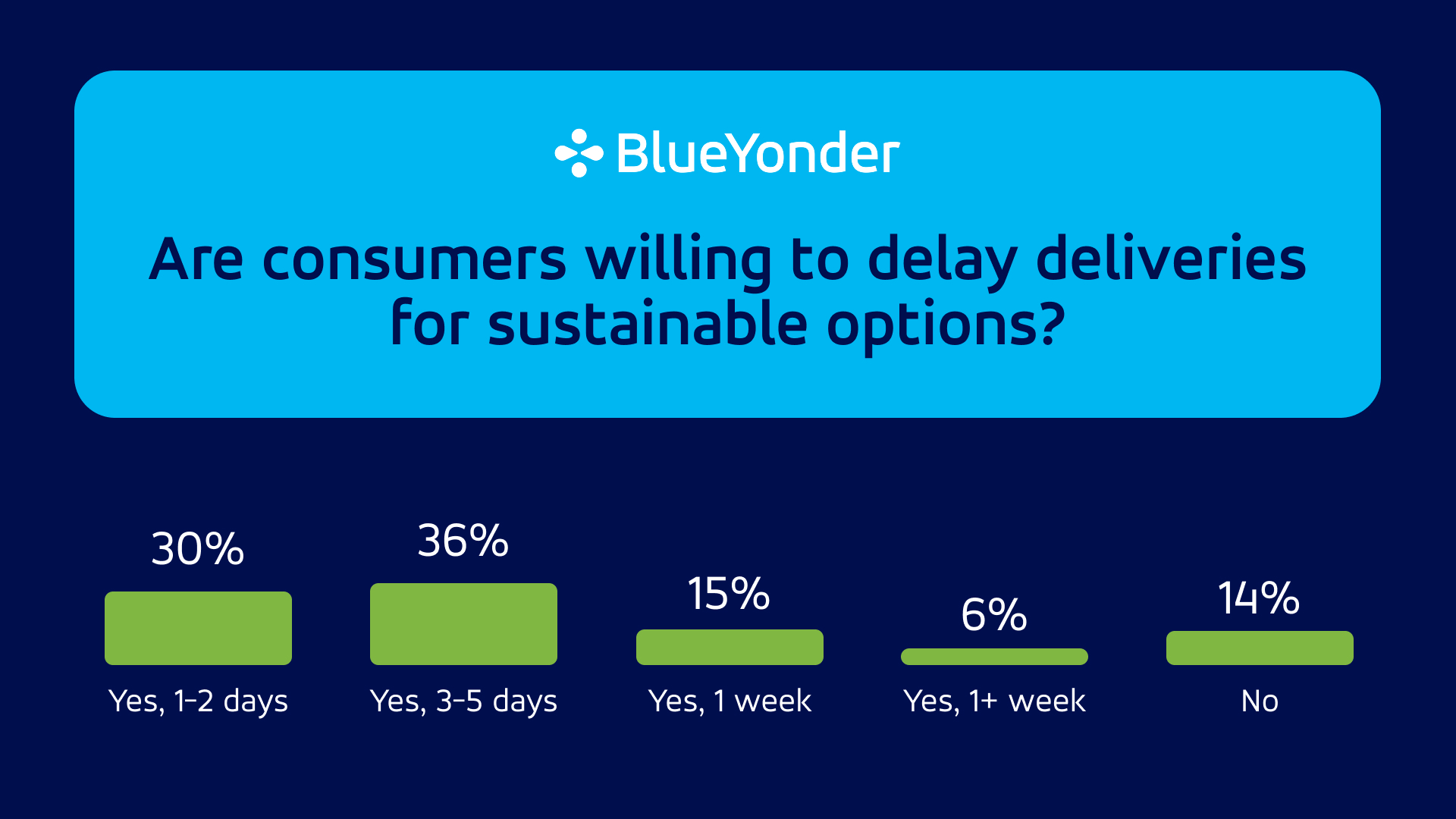
While cost and delivery speed are key factors in consumer choices, they are not the only considerations impacting consumer behavior.
Only 20% of consumers believe brands accurately represent their sustainability
Consumers witness a large amount of sustainability messaging, with 62% of consumers saying they have noticed an increase in brands’ eco-friendly marketing and advertising. But do consumers believe brands’ sustainability efforts are trustworthy?
Unfortunately, only 20% of consumers believe brands accurately represent their sustainability efforts in their marketing. While France shows the highest level of trust (25%), followed by the U.S. (23%), the majority of consumers remain skeptical. A concerning 26% outright distrust brand sustainability claims, with 17% feeling compelled to conduct independent research and 9% perceiving brands as opportunistically leveraging the sustainability trend.
55% of consumers fall into the “sometimes” trust category, suggesting they assess brand claims on a case-by-case basis. This sentiment is consistent across regions, indicating a widespread cautious approach.
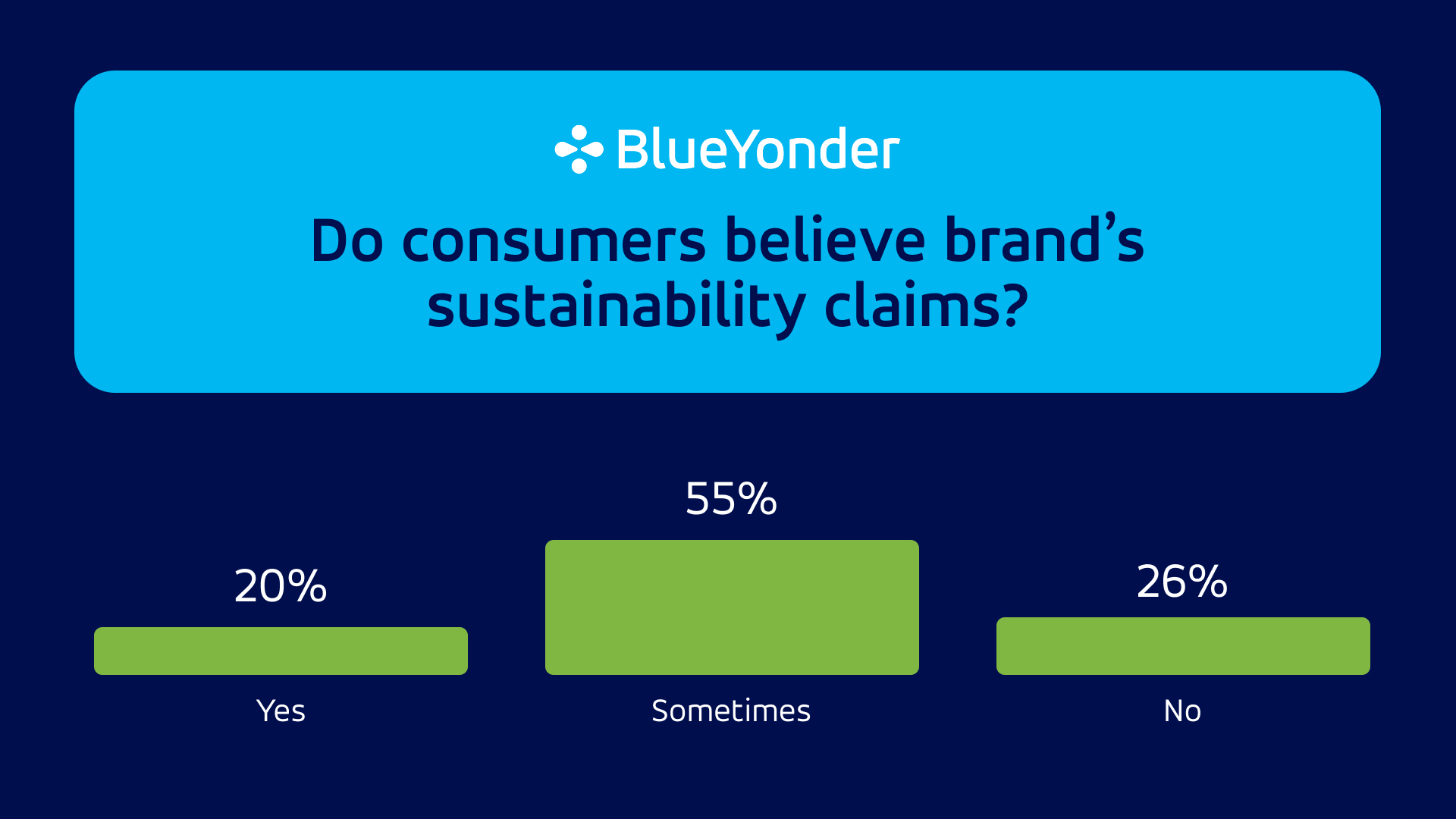
This lack of trust directly impacts consumer behavior. It explains the tension between stated intentions and actual actions. Consumers express a desire for sustainable products and are often willing to pay a premium or make minor sacrifices. However, they lack the confidence to discern truly sustainable options, hindering brand loyalty shifts.
When asked about barriers to sustainable purchasing, 30% of consumers cited insufficient information on product sustainability, while 26% pointed to unclear or misleading claims. Furthermore, 13% expressed a lack of trust in brand commitments, with the U.S. showing the highest level of distrust at 18%.
The data paints a clear picture: consumers are hungry for sustainability, but they’re not buying what brands are selling. To bridge the gap, brands must prioritize transparency, provide verifiable information and build genuine trust. Without these elements, sustainability claims will continue to fall on deaf ears, and consumer actions will remain disconnected from their stated values.
Do consumers place sustainable responsibility elsewhere?
When it comes to driving sustainable change, who should be leading the charge? Our survey reveals a fascinating distribution of perceived responsibility, with 33% of consumers believing that brands and corporations bear the primary responsibility for upholding sustainability efforts. This sentiment is particularly strong in the U.S., with 41% of consumers believing that brands should be responsible.
28% of respondents believe government agencies and policymakers should be held accountable for sustainability. This view is consistent across France, Germany and the U.K., with 31% of consumers answering this way. This is not surprising given the role that UK and European governments have historically played in implementing sustainability-related regulations and consumer protections. Environmental nonprofits and advocacy groups are considered less responsible for sustainability accountability, with only 8% of consumers believing they should be the primary drivers of sustainability.
Interestingly, nearly one-third 32% of consumers believe everyone — brands, governments and nonprofits — shares the responsibility for sustainability. This view is particularly prevalent in Australia and New Zealand (41%) and the U.K. (36%), highlighting a collective sense of accountability.
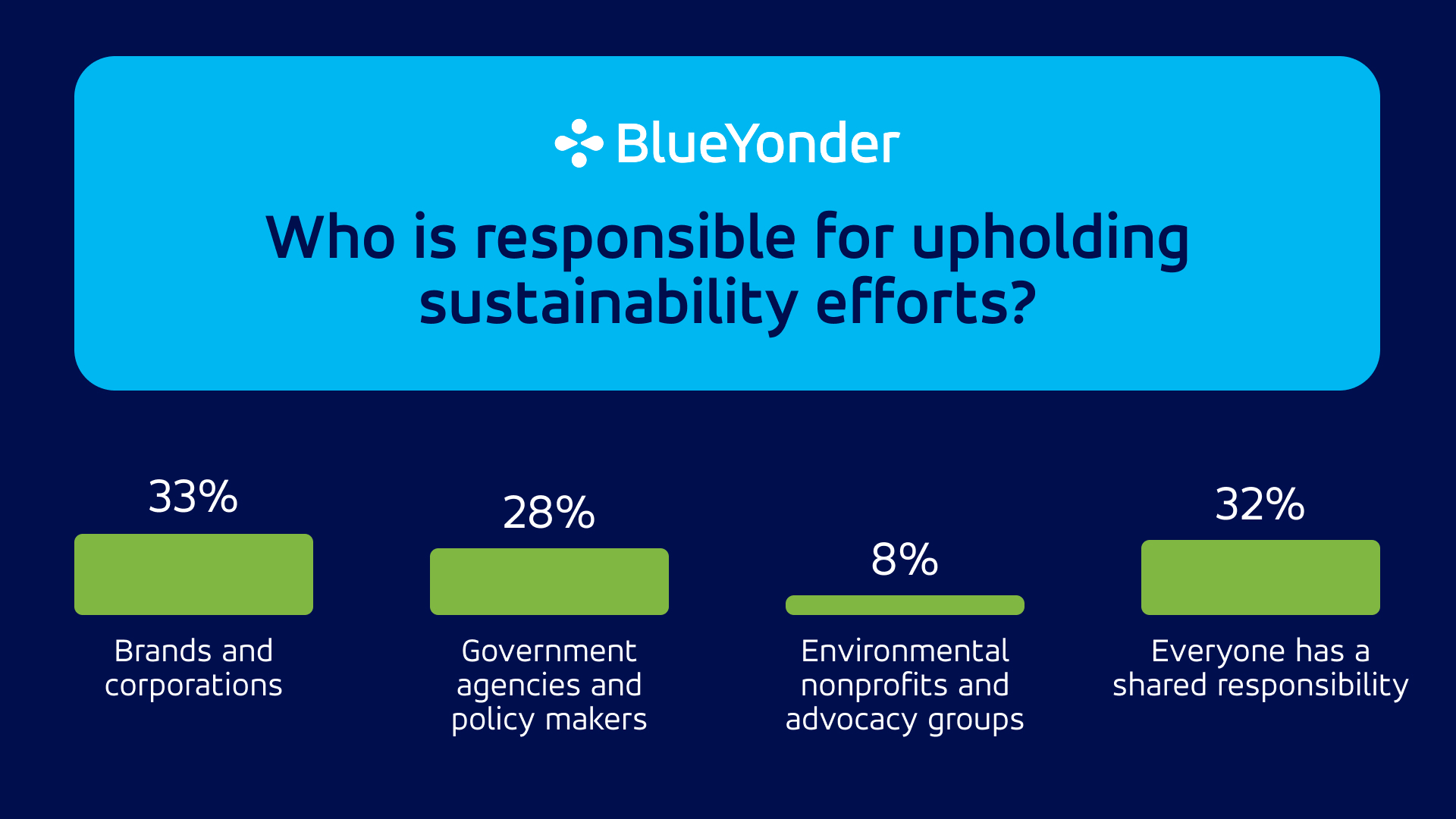
The divided results clearly demonstrate a lack of consensus on where this responsibility lies. However, one thing is clear: consumers look to brands as much or more than to governments for taking responsibility for sustainability. This places a significant burden on businesses to visibly demonstrate their commitment to environmental responsibility. Brands must be proactive and transparent in their sustainability efforts, reassuring consumers that they take their perceived responsibility seriously, which, in turn, would also help build trust in brand claims.
Driving sustainable change with Blue Yonder
The insights from our 2025 Consumer Sustainability Survey provide a valuable snapshot of consumer attitudes and expectations. But this is just one example of how Blue Yonder is empowering businesses to understand and stay ahead of the curve on sustainability.
We recognize that the journey toward a more sustainable future requires a deep understanding of evolving consumer demands, coupled with innovative solutions that enable businesses to operate responsibly. That’s why Blue Yonder is committed to providing the tools and expertise necessary to help organizations navigate the complexities of sustainable commerce.
Learn more about how Blue Yonder can help your business drive sustainable change here.

